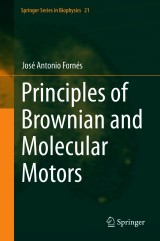Details

Principles of Brownian and Molecular Motors
Springer Series in Biophysics, Band 21
|
96,29 € |
|
| Verlag: | Springer |
| Format: | |
| Veröffentl.: | 04.02.2021 |
| ISBN/EAN: | 9783030649579 |
| Sprache: | englisch |
Dieses eBook enthält ein Wasserzeichen.
Beschreibungen
Molecular motors convert chemical energy (typically from ATP hydrolysis) to directed motion and mechanical work. Biomolecular motors are proteins able of converting chemical energy into mechanical motion and force. Because of their dimension, the many small parts that make up molecular motors must operate at energies only a few times greater than those of the thermal baths. The description of molecular motors must be stochastic in nature. Their actions are often described in terms of Brownian Ratchets mechanisms. In order to describe the principles used in their movement, we need to use the tools that theoretical physics give us. In this book we centralize on the some physical mechanisms of molecular motors.
Brownian Ratchets and Molecular Motors.- The Fokker-Planck equation.- Biased Brownian Motion.- The Smoluchowski model.- Rotation of a dipole.- Ratchet dimer Brownian motor with Hydrodynamic interactions.- Fluctuations of the proton electromotive force across inner mitochondrial membrane.- Quantum Ratchets
<div>Prof. Dr. José Antonio Fornés studied Physics at La Plata University, Argentina, where he received his doctoral degree in Physics in 1972. In 1973 he worked as a postdoctoral fellow in Quantum Chemistry at Uppsala University, Sweden. In 1974 he was a postdoctoral fellow at Middlesex Hospital Medical School of London University, in experimental biophysics. He was visiting Professor at the University of California at Irvine, Department of Physiology and Biophysics, during 1989-1991. Also, he was visiting Professor at the Department of Physics of São Paulo University, Brazil, during 1998-2001. He was visiting professor at the Department of Applied Physics of the Complutense University in Madrid, Spain, during 2005-2006. He has been full Professor of Physics at the Department of Physics of the Federal University of Goiás during 1981-1998, and retired after that. His research interests comprise electrical fluctuations in molecular systems, molecular biophysics, hydrodynamic fluctuations as well as molecular motors<br></div><div><br></div>
Molecular motors convert chemical energy (typically from ATP hydrolysis) to directed motion and mechanical work. Biomolecular motors are proteins able of converting chemical energy into mechanical motion and force. Because of their dimension, the many small parts that make up molecular motors must operate at energies only a few times greater than those of the thermal baths. The description of molecular motors must be stochastic in nature. Their actions are often described in terms of Brownian Ratchets mechanisms. In order to describe the principles used in their movement, we need to use the tools that theoretical physics give us. In this book we centralize on the some physical mechanisms of molecular motors.
Offers detailed explanations for fast understanding the complex subject of molecular motors Written in a simple way for easy comprehension Includes Matlab Code in order to better understand the theory
Diese Produkte könnten Sie auch interessieren:

Alzheimer's Disease: Cellular and Molecular Aspects of Amyloid beta

von: J. Robin Harris, Falk Fahrenholz

213,99 €















